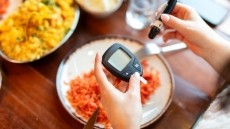Soy isoflavones again linked to blood pressure benefits

The research reports that consumption of the soy compound could lead to as much as a 10 mmHg drop in systolic blood pressure for people with slightly raised blood pressures – known as pre-hypertension. In addition, the study finds for the first time that there is a particular benefit for African American populations – who are known to have a higher risk of raised blood pressure.
The research, presented at the American College of Cardiology's 61st Annual Scientific Session, compared blood pressure levels of people consuming various levels of the soy compound, finding that those who received less than 0.33 mg of isoflavones per day had significantly higher blood pressure levels than those with the highest isoflavone intake (of more than 2.5 mg per day).
"What's unique about this study is that the results are very applicable to the general population. Our results strongly suggest a blood pressure benefit for moderate amounts of dietary isoflavone intake in young black and white adults," said Safiya Richardson, of Columbia University's College of Physicians and Surgeons, USA, who lead the study.
"Our study is [also] the first to show a benefit in African Americans, who have a higher incidence of high blood pressure, with an earlier onset and more severe end-organ damage."
"This could mean that consuming soy protein ... could lead to as much as a 10 mmHg drop in systolic blood pressure for pre-hypertensives, greatly improving their chances of not progressing to hypertension," said Richardson.
She added that any dietary or lifestyle modification people can easily make, which does not require daily medication is ‘exciting’.
Study details
Richardson and her team analysed data from the Coronary Artery Risk Development in Young Adults (CARDIA) study – an NIH-funded study created to examine the development and determinants of cardiovascular disease.
The study began in 1985 with 5,115 African American and white Americans aged 18-30 years old who have been followed and re-examined at various intervals. Year-20 was the first year that participants completed an extensive dietary survey.
They used multivariable linear regression models to evaluate the relationship between daily isoflavone intake and systolic blood pressure after dividing patients across quartiles according to self-reported isoflavone intake.
Richardson noted that even after controlling for age, sex, BMI, smoking, alcohol, physical activity and total caloric intake, the relationship between daily isoflavones and lower systolic blood pressure remained. She explained that as a result, the study helps to lay groundwork for future randomised controlled trials, in order to help better understand the association between isoflavones and blood pressure.













